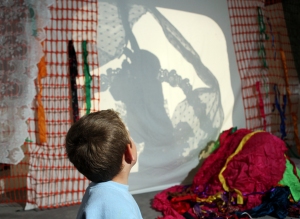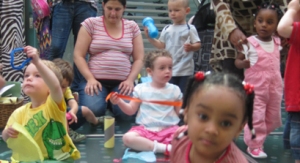A guest blog post from Wild Rumpus:
We are Rowan and Sarah, the directors of Wild Rumpus. We produce large scale outdoor arts events for families, including the award winning Just So Festival. We believe that when families engage together in the highest quality arts in a wild natural landscape, something quite amazing can happen.
Our work is built on the idea that taking the arts outdoors into wild, natural landscapes, and creating a magical and enchanting environment can create transformative moments for families with children from birth onwards. Whole family engagement in the arts, from the very earliest months and years can create memories and experiences that are reinforced and become part of a family’s vocabulary, and the stories that they share.
In moving things outdoors we break down some of the barriers to families participating and go some way to creating the environment for families to have creative adventures on their own terms. Children run, they shout, they play and they explore. The younger ones may simply coo. That’s good enough for us. Instead of trying to squash all that energy into a pre-existing and often intimidating cultural structure, we are letting the cultural forms out, to run and shout, to explore and play too.
We started the festival, a weekend camping event, in no small part because of the way our children interact with the arts. Although we have children of similar ages we soon noticed that we also have different boundaries, different rules and different agendas, so the ways in which we engage in the arts are subtly different. Looking around at our friends we realised that all families go about enjoying the arts in their own way. Some are happy for a no-holds-barred, touch-everything-you can approach, others take a more restrained tack. We keep this in mind with everything we programme at the festival – we want families to move out of their comfort zones and to be open to new experiences but we don’t want to dictate to them how to participate and engage, they must do that in a way that they feel comfortable with, what we can do is provide an environment that’s inspiring and the opportunity to go about things within a fully supportive and positive framework. Families are relaxed and open to new experiences at an festival in a natural landscape, and due in part to this temporary mental landscape, approach the arts in a different way
 The 0-2 age group is not one you naturally think of in conjunction with festivals but we think it’s a great playground for them to enjoy and start to be inspired by art and culture. Babies and toddlers are endlessly curious and love to explore, what better environment to do this in than outdoors, where senses are heightened by the notion that anything is possible. The festival aims to not just tick the boxes in terms of facilities with a comfy breastfeeding tent, a changing tent with free biodegradable nappies and wipes and baby bath time but also with programming of paper play activities, choral lullabies, baby yoga, playing with food, music and movement and storytelling.
The 0-2 age group is not one you naturally think of in conjunction with festivals but we think it’s a great playground for them to enjoy and start to be inspired by art and culture. Babies and toddlers are endlessly curious and love to explore, what better environment to do this in than outdoors, where senses are heightened by the notion that anything is possible. The festival aims to not just tick the boxes in terms of facilities with a comfy breastfeeding tent, a changing tent with free biodegradable nappies and wipes and baby bath time but also with programming of paper play activities, choral lullabies, baby yoga, playing with food, music and movement and storytelling.
The immersive nature of a festival environment means that you can be surrounded by art all the time, there can be opportunities to join in, to listen, to watch whilst eating dinner, whilst playing, whilst brushing teeth, whilst in your pyjamas. We know because we’ve already made it happen and heard the wonderful feedback so many families have given us as a result – you’re never too young to festival.












